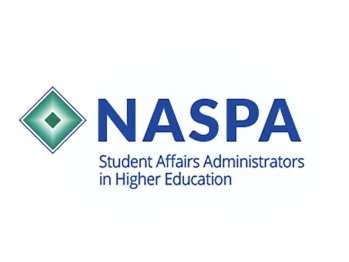October 7, 2022
Call for Programs Due
September 30, 2022
Early Bird Registration Ends
November 17, 2022
European Conference Begins
2022 European Conference for Student Affairs and Services
Regional Annual Conferences Supporting the Profession Community Global Division International Education
November 17 - November 19, 2022 Francisco University of Vitoria, Madrid, Spain
NASPA – Student Affairs Administrators in Higher Education, UFV - Universidad Francisco de Vitoria, and EucA – European university college Association, invite you to the fourth European Conference for Student Affairs and Services, held at UFV on 17-19 November 2022.
The conference provides a platform for student services professionals, academics, researchers, and policymakers to discuss innovative programs, practices, models and trends in student affairs. The theme of this year will be The Role of Student Affairs in a Hyper-Connected World.
![]()
Presented By

European Conference: Call for Programs
NASPA – Student Affairs Administrators in Higher Education, EucA – European university college Association, and UFV - Universidad Francisco de Vitoria invite you to submit programs for the 4th Annual European Conference on Student Affairs and Services, to be held in Madrid Spain, 17-19 November, 2022. This conference provides a platform for student services professionals, academics, researchers, and policy makers to discuss innovative programs, practices, models and trends in student affairs.
Submission Criteria
Proposals will be evaluated by several program reviewers using the following five (5) standards:
- Significant and creative contributions to the student affairs profession.
- Engaging program format that involves the audience and stimulates discussion.
- Conceptually strong foundation, well-written, with clearly stated outcomes and appropriately documented research and/or experience.
- Qualified presenters with expertise in the subject matter.
- Thematically relevant program content incorporating the conference focus area(s) into the program.
Notification: Presenters whose proposals are accepted must register for the conference. Acceptance will be confirmed by the Conference Committee.
Presenters will be expected to pay registration in order to present and attend the conference. All presenters will be expected to provide an electronic copy of their presentation which will be posted on the conference website for participants to view at the conclusion of the conference.
Conference Themes and Suggested Topics
Student Advising and Support
In Higher Education, the role of mentors has seen significant interest as it relates to supporting students and their maturity. In a post COVID-19 scenario, there are many student needs that can be addressed through different initiatives regarding advising and mentoring students. Through thoughtful mentorship and engagement, students grow in skills such as conflict management, group dynamics, and peer learning. Students learn how to support each other. In this track, we want to delve into experiences that can enlighten ways in which Students Affairs professionals can help students thrive in their university experience.
- Address the knowledge, skills, and dispositions related to providing advising and support to individuals and groups through direction, feedback, critique, referral, and guidance.
- Facilitate reflection to make meaning from experiences with students, groups, colleagues, and others.
- Facilitate problem-solving and individual decision-making and goal-setting
- Provide resources and tools to appropriately challenge and support students and colleagues.
- Identify support initiatives that integrate peer support from tutors, resident assistants or other senior students.
Students Well-Being
Institutions of Higher Education around the world are experiencing a wave of incoming students who have experienced trauma and loss due to pandemic, economic, societal, and political events. As professionals in Higher Education, how do we equip ourselves to support these students?
- Unpack holistic student well-being and its relationship with student success in Higher Education.
- Create opportunities to define current health triggers (pandemic, economic loss) and its impact on the community.
- Define current mental health conditions (e.g. addiction, depression, substance abuse, etc.) which represent challenges to student success and well-being.
- Identify collaborative models between service practitioners (qualified mental health professionals) on campus and outside support.
- Identify successful practices and programs that support student resilience, work/study-life balance, healthy habits, community engagement, responsible use of social media and online presence or activity.
Next Education Challenges
As Higher Education institutions reinvent themselves for defining the next milestones and educating young people, how can student affairs professionals contribute to support forward looking educational missions to achieve more peaceful, equitable and sustainable societies? How can we redefine our practices and what tools are useful for a new blended learning experience and ensure thus student success? How can we empower students to be positive change makers in their communities or globally??
- Identify initiatives for new curriculum development that support students to act as change agents for a positive impact in our world or empower them as active citizens in their communities?
- Explore virtual or hybrid programming ideas, lessons learned or promising practices experimented during and after the pandemic.
- Identify initiatives or tools that develop students’ digital skills and online reputation management.
- Explore green education initiatives, including United Nations’ SDGs, that advance and scale sustainability practices at both personal and institutional levels.
Student Success & Residential Life
How can student affairs work with intentionality to expand the out-of-classroom experience for all students? What are some promising practices in building a residential curriculum to ensure meaningful learning that goes beyond attendance? How to build a culture of assessment in residential life? These questions are meant to guide the discussions of news trends and challenges in student learning and engagement in residential settings.?
- Identify initiatives that increase and deepen students’ participation and engagement in educational programs on campus or residential halls.
- Identify successful practices which document learning in residential settings or informal learning programs that improve overall student success.
- Describe how involving student leaders on campus or residential halls expands student learning (e.g., tutors, orientation mentor, resident assistant, academic mentor etc.)
- Explore strategies to build intentional, inclusive and supportive learning environments and/or living-learning communities post COVID-19.
- Understand the various ways institutions document learning, both inside and outside of the classroom.
- Demonstrate how effective programs can tighten the graduate skills gap in order to improve international mobility and employability.
The schedule will be designed to provide attendees with interactive and engaging programming, and opportunities for deeper discussion, and networking. As details are finalized, this schedule will be updated.
4th Annual European Conference for Student Affairs and Services Schedule
All times are Central European Time and are subject to change
17 November
18 November
19 November
Keynote Speakers
NASPA Global Health, Safety, and Responsibility
In keeping with the Association's duty to care and responsibility as host, NASPA leadership strongly encourages all participants at NASPA events whether a presenter, attendee, exhibitor, staff, guest, or vendor to be fully vaccinated. Please see the NASPA Global Health, Safety, and Responsibility webpage for complete information about NASPA's policy.

